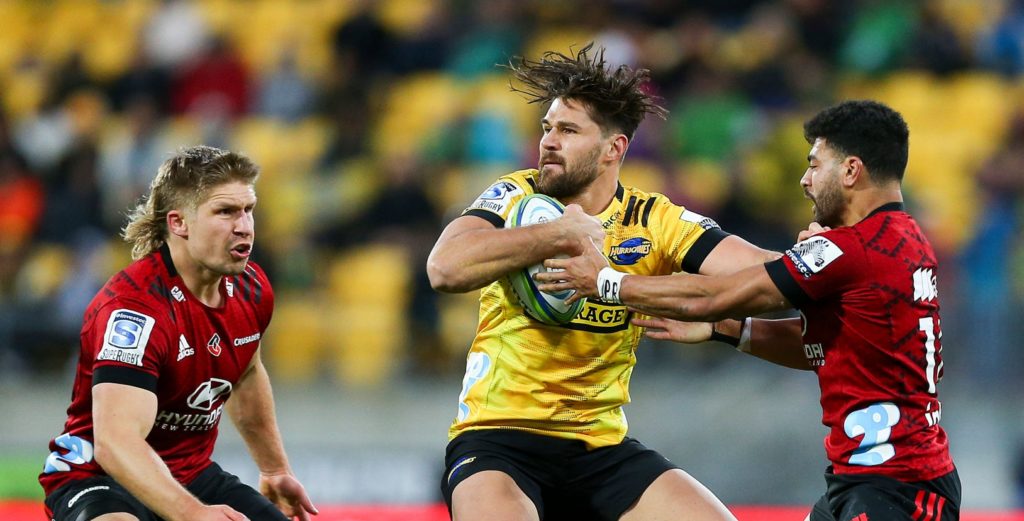More South African backs should look to New Zealand to further their careers, writes Andre-Pierre Cronje in a letter to the editor.
CALLING OUR READERS: Send your rugby letter to the editor
Five carries, four defenders beaten, three clean breaks, 46 running metres, one try, seven tackles, five passes and one offload. So read the impressive stats of Hurricanes wing Kobus van Wyk’s performance against the Highlanders.
At the time of writing, Van Wyk has now scored seven tries in six games for his adoptive Kiwi side. The question remains, how is it that a wing not even on the Springbok radar has suddenly turned so prolific? The answer, it appears, is simple: New Zealand has by far and away the best coaching structures for backline players.
One need only look at the strength in depth New Zealand has on the wings for proof. Sevu Reece and George Bridge have in the space of a year become All Blacks mainstays and yet, as if from nowhere, prodigious talents Mark Telea, Will Jordan, Caleb Clarke and Ben Lam are challenging their positions.
Such is the quality on the wings that Rieko Ioane, one of the most talented finishers in the game of rugby, has transitioned to outside centre as he could not consistently make the All Blacks starting team at wing.
At flyhalf and centre New Zealand also has a similar embarrassment of riches. Richie Mo’unga is in positively frightening form and starting to prove just why he has made that famous All Blacks No 10 shirt his own ahead of Beauden Barrett.
Such is the depth in the position that the third- and fourth-choice NZ flyhalves (the ever-classy Aaron Cruden and upstart Otere Black) would likely be in the national set-up of almost any other international side. Jack Goodhue and the aforementioned Ioane have been the standout centres amid a sea of talent, including Ngani Laumape and Vince Aso.
It is not luck that New Zealand appears to have an endless conveyer belt of backline talent. It is genetic. It is quite simply in New Zealand’s rugby DNA to produce the best backline players in the world. From Jonah Lomu and John Kirwan to Dan Carter and Carlos Spencer and now to Barrett and Ioane, the NZ rugby factory keeps churning them out.
The Kiwi rugby philosophy that places emphasis on the speed, skill and vision of its players informs all New Zealand’s coaching structures from school and grassroots level up to the national side. And these coaching structures are what consistently deliver quality backline players.
It is clear, then, that the attributes of a fantastic backline player are all eminently coachable – just that New Zealand does so better than anybody else in the world. It seems strange, then, that so few South African backline players have opted to make a move to the Land of the Long White Cloud in order to improve themselves as rugby players.
Whereas moves to Europe and Japan are commonplace, South Africans looking to gain experience in New Zealand are few and far between.
Perhaps it is a cultural hang-up that stops South Africans; a reluctance to play for the old enemy. Maybe it’s that a career in New Zealand is not as lucrative as one in Europe or Japan. Or maybe it’s just because there are just fewer opportunities in NZ; their backlines are so packed with talent that it is difficult to see where South African players would fit in. Whatever the reason may be, South African players are missing an opportunity.
South Africa has by far and away the strongest schools and junior rugby on the planet, a consequence – in part – of the over-professionalisation of the sport at youth level (a discussion for a different day). Such is the talent on display that European clubs now regularly recruit South African boys straight out of school.
The chance to forge a career in Europe is appealing to some (not to mention the financial incentives) but it remains to be seen the extent to which such a move will develop these youngsters as rugby players.
Up-and-coming South African backline players would do well to look past the glitz of a European rugby contract; all that glitters is not gold. Instead they should look for an opportunity in New Zealand where they are all but guaranteed to improve as players.
Yes, it may mean forgoing that alluring French contract, but in the long run it may boost a player’s chances of playing Test rugby – surely the pinnacle of any player’s career ambitions.
It will not be a simple task; it is easier for a camel to pass through the eye of a needle than it is for a South African to play in New Zealand. However, players like Kobus van Wyk show just how beneficial such a move could be.
One can only imagine what impact playing in a New Zealand set-up could have on the careers of players such as Damian Willemse, Curwin Bosch or Wandisile Simelane.
– Andre-Pierre Cronje
ALSO READ: Rethinking the role of South Africa A
*If you’d like to join Andre-Pierre in sending us a rugby letter, we invite you to send any of your thoughts or memories in an email to editor Craig Lewis at this address: [email protected]
Photo: Hagen Hopkins/Getty Images





